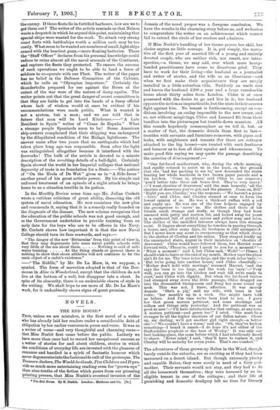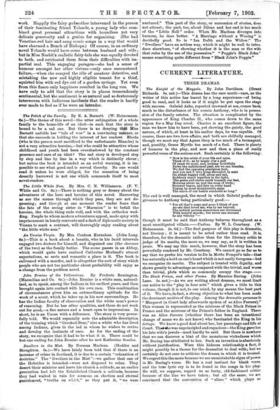NOVELS.
1.11/. RED HOUSE.* Tam, unless we are mistaken, is the first novel of a writer who has already laid her readers under a considerable debt of obligation by her earlier ventures in prose and verse. It was as a writer of verse—and very thoughtful and charming verse— that Miss Nesbit first came before the public. Latterly we have more than once had to record her unequivocal success as a writer of stories for and about children, stories in which the conditions of everyday life are invested with the glamour of romance and handled in a spirit of fantastic humour which never degenerates into the fashionable cult of the grotesque. The Treasure-Seekers, The Would-be-Goods, live Children and It pro- vide so much more entertaining reading even for "grown-ups" than nine-tenths of the fiction which pours from our groaning Printing presses, that Miss Nesbit's eventual invasion of the • The Bed Hauge. By E. Nesbit. London: Methuen and Co. Ds.] domain of the novel proper was a foregone conclusion. We have the results in the charming story before us, and we hasten to congratulate the writer on an achievement which cannot fail to extend the circle of her readers and admirers.
If Miss Nesbit's handling of her theme proves her skill, her choice argues no little courage. It is, put simply, the narra- tive of the first year of married life of a young and entirely devoted couple, who are neither rich, nor smart, nor intro- spective,—a theme, we may add, over which more heavy- handed practitioners have come to disastrous grief. They have to work for their living—the husband as a journalist and writer of stories, and the wife as an illustrator—and when we first make their acquaintance they are snugly installed in a little suburban villa. Suddenly an uncle dies and leaves the husband 2200 a year and a large ramshackle house about thirty miles from London. Chloe is at once possessed with the desire to go and live in it; her husband opposes the notion as impracticable, but the stars in their courses fight against him. No tenant is forthcoming, except on con- ditions involving an outlay impossible to the new owner, and so, not without misgivings, Chloe and Leonard flit from their bandbox into the picturesque but tumble-down mansion. All this sounds hopelessly commonplace as we tell it, but, m- a matter of fact, the domestic details from first to last— troubles with servants and furniture-removers, with pipes and leaks, with neighbours and tenants (for there are cottages attached to the big house)—are treated with such freshness and humour as to lose all their squalor and irksomeness. To make good this saying we may quote the passage describing. the miseries of demenagentent :— "Our fat-faced maidservant, who, during the whole morning, had rigidly refused to assist us in the least, on the ground that she had her packing to see to,' now descended the stairs bearing her whole wardrobe in two brown paper parcels and a tin hat-box. Come in, please,' said Chloe to our remover ; you'd better take these oak boxes first. They're very heavy.' = I want chesties of drawerses: said the man hoarsely, all the ohesties of drawerses you've got, and the planner. Come on, Bill? Right you are, Charley,' was the response.—' We haven't a piano —here,' said Chloe, and Charley seemed at once to form the lowest opinion of us. He was a thick-set ruffian with a red. and angry eye. He was one of the four helpers engaged by the greengrocer to move' us. His clothes and those of his friends smelt strange and stuffy, as though they had been smeared with putty and mutton fat, and locked away for years in a cupboard full of pickled onions and yellow soap and mice. The clothes of the unskilled labourer always have this strange scent. It lingers about everything he touches in passing through a house, and, after many days, its freshness is still unimpaired. But I never knew any scent so overpowering as that which clung to the clothes of Charley and his mates. They strayed loudly up the uncarpeted stairs, urgent in their insistence on chesties of drawerses.' Chloe would have followed them, but Harriet came forward with,' Please'm, could I speak to you for a moment ?'- 'What What a moment !' said I, but Chloe said, ' Well ?'—' Please, I should wish to leave at the end of my month. Mother Bays the place ain't fit for me. The 'ouse is too large, and the work is too 'eavy:— But we're going into another house,' said Chloe cheerfully.— ' Mother don't hold with movings: resumed Harriet, and she says the 'ouse is too large, and the work too 'eavy.'—` Very well, you can go into the kitchen and wait till we're ready to start,' said Chloe with dignity. But when the fat-faced traitor had stumped away down the little passage, Chloe dragged me into the dismantled dining-room and flung her arms round my neck. This was not, I knew, affection. It was merely• despair. She's a pig,' said my wife, with tears in her voice; her month's up in a week. She might have told us before. And I'm sure we've been kind to her. I gave her that green moreen petticoat, and some stockings and collars and things only yesterday. And the petticoat was as good as new?—' I'll have satisfaction for that outrage, at any rate.
moreen petticoat—and green too !' I cried. She must be a stranger to all the higher emotions of our fallen nature. Cheer up, my dealing, we'll get another girl right enough—a better one.'—' We couldn't have a worse,' said she. Oh, they've broken something—I heard it smash—I do hope it's not either of the Staffordshire prophets or the bust of Wesley.' It was only our best looking-glass, the same before which I had rebelliously dared to shave. Never mind,' I said, they'll have to replace it, and Charley will be unlucky for seven years. That's one comfort.' "
The adventures of these grown-up Babes in the Wood, though barely outside the suburbs, are as exciting as if they had been
marooned, on a desert island. But though extremely plucky and capable Babes, they were sorely in need of a fairy god- mother. Their servants would not stay, and they had to do- all the housework themselves ; they were harassed by an in- eligible tenant in one of the cottages ; and their life of picnicking and domestic drudgery left no time for literary work. Happily the fairy godmother intervened in the person of their fascinating friend Yolande, a young lady who com- bined great personal attractions with boundless yet very delicate generosity and a genius for organising. (She had Venetian-red hair and sang comic songs in a way that would have charmed a Bench of Bishops.) Of course, in an ordinary novel Yolande would have come between husband and wife ; but in Miss Nesbit's realistic fairy-tale she was equally devoted to both, and extricated them from their difficulties with im- partial zeaL This engaging paragon—she had a sense of humour amongst her other virtues—only once encountered failure,—when she essayed the role of amateur detective, and mistaking the new and highly eligible tenant for a thief, squirted him with red dye out of a garden syringe. Yet even from this fiasco only happiness resulted in the long run. We have only to add that the story is in places tremendously sentimental, but the sentiment is so natural and so dexterously interwoven with ludicrous incidents that the reader is hardly ever made to feel as if he were an intruder.











































 Previous page
Previous page